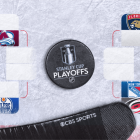
Juuse Saros has been the No. 1 goaltender for the Nashville Predators since he wrestled the job away from franchise legend Pekka Rinne in the 2019-20 season. How much longer that remains the case is up to first-year general manager Barry Trotz, who has a huge decision to make with the NHL trade deadline just days away.
Saros has become an integral part of the Predators over the last five years. His superhuman feats between the pipes have buoyed some otherwise pedestrian rosters and thrust him into the Vezina Trophy conversation on an annual basis.
It's tough to imagine where the Predators would have been without Saros backstopping them over the last few years. It's also closing in on time to part ways with Saros and chart a new direction for the franchise. Between Saros' contract situation and former No. 11 overall pick Yaroslav Askarov dominating in Milwaukee, Nashville has hit a fork in the road -- and the correct path forward is relatively clear.
Saros has one year left on his contract after the 2024-2025 season, and it is at an incredibly reasonable cap hit of $5 million. Most teams can search high and low for elite goaltending at that value and never find it, but that's exactly why Trotz needs to do his best to find a dance partner between now and the March 8 trade deadline.
Once that deal comes up, Saros will be 30 years old and looking for a big raise. Can Trotz and the Predators really make that commitment, given the timing of their rebuild and the fact that Askarov could very well be ready for a full NHL workload by then?
Now in his second season with the AHL's Milwaukee Admirals, Askarov has posted a GAA of 2.14 and a save percentage of .920. Those are absurd numbers for that level, considering the defense in front of him isn't always the cleanest. Oh, and Askarov is making showtopping saves like this regularly.
This is insane. Yaroslav Askarov makes a poke check save on this breakaway and follows it up with a diving glove save.
— Alex Daugherty (@AlexDaugherty1) February 22, 2024
"He's a human circus" - @aaronadmirals pic.twitter.com/SVBgGDcQKu
While there is no guarantee Askarov successfully makes the transition to the NHL and reaches the level of Saros, he has all the tools to become a star at the next level. It's also plausible Askarov jumps to the NHL and becomes even better than Saros. It's a high bar to clear, but Askarov has passed every test he's faced to this point.
Then, there is the fact that Saros will be able to get an 18-wheeler full of cash when he becomes a free agent in the summer of 2025. How much sense would it make for Nashville to make an expensive eight-year commitment to Saros when Askarov could be fighting to earn more starts on a cheaper contract? There's a good argument to be made that the Predators could use that extra cap space, as well as the assets gained from a potential Saros trade, to bolster their roster elsewhere.
In fairness to Trotz, the math on trading Saros may have changed a bit over the last couple weeks. Following the Predators' 9-2 loss at the hands of the Dallas Stars, trading Saros for picks and high-end prospects seemed like a no-brainer. Then, the Predators missed one U2 show, and they are now riding an eight-game win streak that has put them solidly in playoff position.
Over that stretch, Saros has been at his very best. In his last six starts, Saros has a save percentage of .954 and has saved 9.54 goals above average, according to Natural Stat Trick.
It also probably hurts that one of the most obvious trade partners, the New Jersey Devils, are now well outside a playoff spot and just fired their head coach. It takes two to tango, and New Jersey may have left the dance early. Still, the Los Angeles Kings, Carolina Hurricanes and Edmonton Oilers could all be viable options to varying degrees.
All of that has made trading Juuse Saros much more difficult. As a former coach, Trotz probably knows what it would do to the locker room if he traded away the team's star goalie and one of the most well-liked teammates in the midst of an impressive playoff push. He also probably knows that it might be an unpopular decision with some portion of the fan base.
However, Trotz is now in the general manager's chair, and part of his new gig is seeing the bigger picture. That means keeping in mind that Nashville is still very much in rebuilding mode, despite the fact that the team appears bound for the postseason in Andrew Brunette's first year behind the bench.
Making the playoffs is no longer the goal in Nashville, not since the 2015-16 season. The Predators are trying to build a Stanley Cup winner, and they still have some work to do in that department. Nashville lacks the offensive firepower of Western Conference juggernauts like the Colorado Avalanche, Dallas Stars, Vegas Golden Knights, Edmonton Oilers and Vancouver Canucks.
They can close that gap by stocking up on top-end prospects and draft capital in a Juuse Saros deal and rolling the dice on Askarov in the NHL.
Now, that would be an uncomfortable decision, but what exactly has comfortable gotten the Predators recently? Five playoff wins since the start of the 2018-19 season. Trotz and Nashville are aiming considerably higher than that, and that means making a bold move in net.
This winning streak and playoff push shouldn't derail the Predators' rebuild. Even if Trotz can't find an adequate suitor by this week's trade deadline, he should be making plenty of calls about Saros in the summer. The risk of waiting is that Saros' value could go down after the deadline because he will be a pending free agent next year, so sooner might be better.
It's time for the Predators to get a little more uncomfortable in pursuit of a Stanley Cup.





















